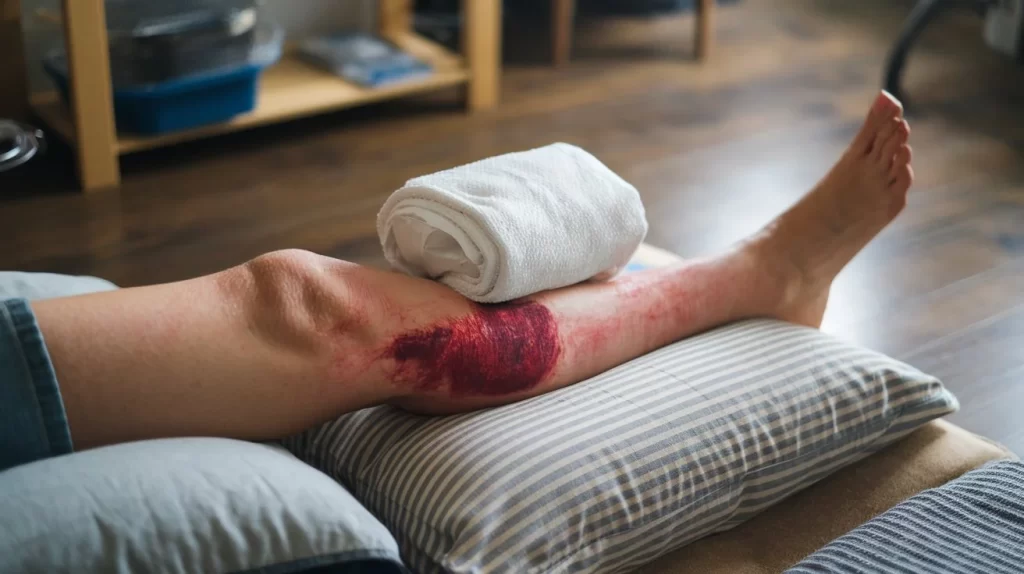Table of Contents
Swelling is a common reaction to injuries, surgeries, and even infections. How long does swelling last? you’re not alone. Understanding how swelling works and what to expect can make a difference in your recovery. In this article, we’ll explore how long swelling typically lasts, the factors that affect it, and what you can do to speed up the healing process.
What Causes Swelling?

Swelling, or oedema, happens when fluid builds up in the body’s tissues. It’s a natural part of the body’s healing process and can occur after injuries like sprains, surgeries, infections, or prolonged sitting or standing. This fluid accumulation is often the body’s way of protecting the injured area, but it can sometimes be uncomfortable and alarming.
So, how long does swelling last, and why does it occur? Here are the main reasons for swelling:
- Injury: Whether it’s a sprain, cut, or bruise, the body sends extra blood to the injured area, which can cause swelling.
- Infection: Swelling is the body’s response to fight infection.
- Surgery: After surgery, swelling is part of the healing process and can last several weeks.
- Chronic Conditions: Conditions like heart failure or kidney disease can cause long-term swelling.
How Long Does Swelling Last After an Injury?
Your swelling usually peaks within the first 24 to 48 hours after an injury. For minor injuries, you may notice a reduction in swelling after about 3-5 days. However, depending on the severity of the injury, swelling may last a week or more.
If you’re wondering how long does swelling last for more severe injuries, the healing process might take longer. For example:
- Mild injuries: Swelling can last 2-3 days.
- Moderate injuries: Swelling may take up to a week.
- Severe injuries: Swelling could persist for weeks.
How to Speed Up Recovery from Swelling?
Reducing swelling faster is possible with proper care. Here are some tips:
- Rest: Give your body time to heal by resting the affected area.
- Ice: To reduce swelling, apply ice for 15-20 minutes every 1-2 hours during the first 48 hours.
- Compression: Use an elastic bandage to wrap the area, which helps reduce swelling.
- Elevation: Elevate the injured area above heart level to help fluid drain from the swollen area.
How Long Does Swelling Last After Surgery?

Surgical swelling can be more prolonged than injury swelling. Swelling after surgery may last 2-3 weeks or longer, depending on the type of surgery. For major surgeries, swelling could last even longer. Most of the time, swelling will peak 2-3 days post-surgery, but it’s not uncommon for it to take up to several months to entirely subside.
Post-Surgical Care to Reduce Swelling
Reducing swelling after surgery requires patience and proper care. Here’s what you can do:
- Follow the Doctor’s Instructions: Always follow your doctor’s advice to manage post-surgical swelling.
- Keep the Area Elevated: Just like with injury-related swelling, keeping the area elevated can help reduce fluid buildup.
- Stay Hydrated: Drinking water can help flush out excess fluids.
- Massage (if approved): Gentle massages can improve blood circulation and reduce swelling.
- Wear Compression Garments: If your doctor advises, wear compression stockings or wraps to support healing.
Factors That Affect How Long Swelling Lasts
Several factors can influence how long swelling lasts. Understanding these can help set realistic expectations for recovery:
- Severity of Injury or Surgery: The more severe the injury or surgery, the longer the swelling may last.
- Age: Older adults take longer to recover from swelling than younger individuals.
- Health Conditions: People with underlying health conditions like diabetes or circulatory issues may experience longer recovery times.
- Lifestyle: Smoking, poor diet, and lack of movement can slow down the body’s ability to reduce swelling.
When to See a Doctor About Swelling?
Swelling is usually part of the healing process, but sometimes, it can be a sign of a more severe problem. Seek medical attention if:
- The swelling lasts longer than expected.
- There is increasing pain or redness.
- You notice warmth around the swollen area.
- You develop a fever or experience chills.
If you are concerned about how long your swelling lasts, don’t hesitate to consult a healthcare professional.
How Long Does Swelling Last with Infections?
Swelling caused by infections can vary in duration depending on the type and severity of the infection. In general, swelling from mild infections may reduce once the body begins to fight off the disease or after antibiotics are administered. This typically takes about 2-5 days. However, the swelling may last much longer for more severe infections, especially if not treated promptly.
Treating Infection-Related Swelling
For swelling due to infections, proper treatment is critical to reducing it. Here’s how you can manage it:
- Take Antibiotics (if prescribed): If a doctor prescribes antibiotics, take them as directed.
- Keep the Area Clean: Ensure the infected area is clean and dry to prevent further infection.
- Use Cold Compresses: A cold compress can help ease discomfort and reduce swelling.
Home Remedies to Reduce Swelling Faster
How long does swelling last with home remedies? While these methods may not eliminate swelling, they can help speed up the recovery process:
- Epsom Salt Soak: Soaking the swollen area in warm water mixed with Epsom salt may help reduce swelling.
- Herbal Remedies: Some people find relief with natural remedies like turmeric or ginger, which have anti-inflammatory properties.
- Stay Active: Gentle movement can promote circulation, helping to reduce swelling.
How long does swelling last? In most cases, minor swelling subsides within a few days, while more severe swelling can last weeks or months. The duration of how long does swelling last largely depends on the cause and severity of the swelling, as well as how well you take care of the affected area.
Also Read: How Long Does Suboxone Block Opiates? Discover the Surprising Truth
Whether the swelling is from an injury, surgery, or infection, understanding how long does swelling last and following the proper steps can help you recover faster. If you’re unsure about how long does swelling last in your specific case, don’t hesitate to reach out to a healthcare provider for advice. By taking proactive steps and giving your body the care it needs, you can ensure a smoother, faster recovery.



